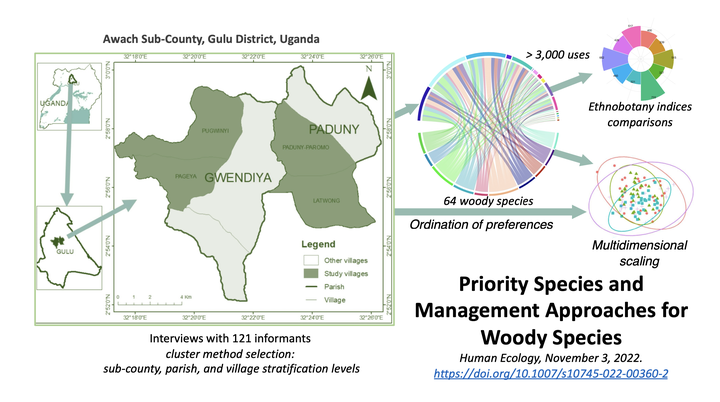Priority Species and Management Approaches for Woody Species
 Overview of Tabuti et al. 2022.
Overview of Tabuti et al. 2022.
Woody plants support the livelihoods and well-being of communities around the world. However, the establishment, management, and use of essential woody species can vary across regions. A recently published paper in Human Ecology titled ‘Priority Species and Management Approaches for Woody Species: A Case Study of Awach Sub-county, Gulu District, Uganda’ by colleagues at Makerere University, Gulu University, and University of Bonn’s Dr. Cory Whitney, describes the diversity and use of woody species and explores the values for which people maintain and protect these plants. They use household interviews and exploratory quantitative ethnobotany with ethnobotanyR to reveal 64 multipurpose tree species. The results indicate that respondents actively manage species with material contributions such as household commodities and income generation. However, non-material and regulatory services were often not considered. Locally this lack of recognition is contributing to insufficient active management, unintended losses and negative repercussions for biodiversity. There are also many challenges for tree management, such as pests, diseases and lack of infrastructure. The findings offer insights into potential policy mechanisms targeting the establishment of trees in the region and other parts of Uganda and sub-Saharan Africa.
Tabuti, John Robert Stephen, Esther Patricia Adoch, Christopher Mawa, and Cory Whitney. “Priority Species and Management Approaches for Woody Species: A Case Study of Awach Sub-County, Gulu District, Uganda.” Human Ecology, November 3, 2022. doi: https://doi.org/10.1007/s10745-022-00360-2
Whitney C (2022). ethnobotanyR: Calculate Quantitative Ethnobotany Indices. R package version 0.1.9, https://CRAN.R-project.org/package=ethnobotanyR.